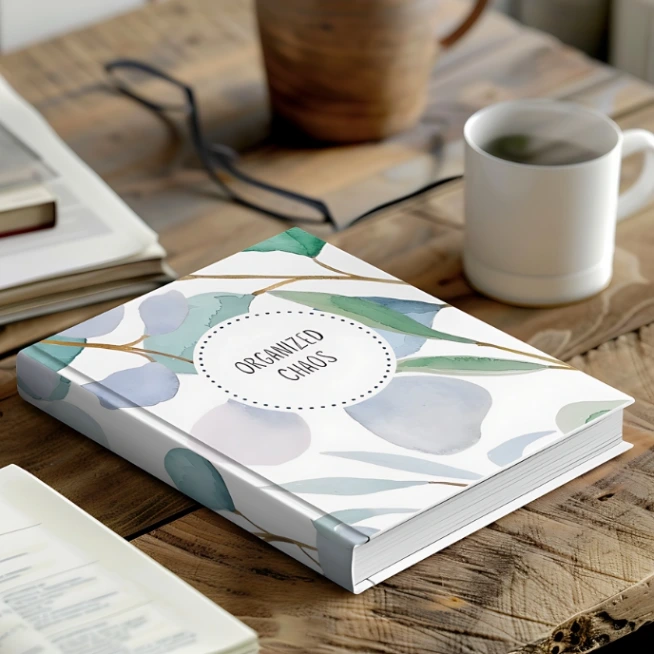The Ultimate Guide to Journaling: Benefits, Prompts, and How to Get Started

Table of Contents
What is Journaling?
Let’s start with the basics. Journaling, at its heart, is simply you talking to you. No filters. No expectations. No performance. Just you, a pen (or keyboard), and a safe space to unload your thoughts.
Sounds simple, right? But don’t let that simplicity fool you.
Journaling isn’t just a brain dump or a glorified to-do list. It’s a doorway into your mind, a quiet place to reconnect with who you are when the world gets loud. When life feels tangled or your emotions run wild, journaling is like untangling that knot thread by thread. It slows things down. It makes the invisible visible.
Some people journal to make sense of their thoughts. Others do it to reflect, heal, dream, or plan. There’s no one “right” way to do it, and that’s the magic – it’s totally yours.
In fact, journaling isn’t new. From ancient philosophers like Marcus Aurelius to modern icons like Oprah, people have long turned to the written word as a tool for self-discovery and growth. And now, in a time when digital noise is at an all-time high, journaling has re-emerged as a much-needed pause button for the soul.
Why Journaling Has Become So Popular
We live in a world that rarely stops. Notifications, deadlines, updates – everything moves fast. And somewhere in that chaos, we lose touch with ourselves.
Enter journaling.
It’s no coincidence that journaling has made a major comeback in recent years. It’s more than a self-care trend – it’s a lifeline. It’s your chance to disconnect from the noise and reconnect with what’s real. With what’s you.
Social media has glamorised it, yes – those cosy, candlelit flat-lays of bullet journals and highlighters – but there’s substance beneath the aesthetic. People are turning to journaling because it works. Studies show it reduces stress, boosts emotional well-being, and improves focus.
And the beauty of it? Anyone can do it.
You don’t need to be a “writer.” You don’t need fancy tools. You just need a willingness to show up for yourself – even if it’s just for five minutes a day. In a culture obsessed with output, journaling invites you inward. It asks, “How are you, really?”
And sometimes, that’s the question that changes everything.

The Different Types of Journaling
Here’s the thing – journaling isn’t one-size-fits-all. Think of it more like a buffet. There are different styles and approaches, and the key is finding what resonates with you.
Let’s break down a few of the most popular types:
- Reflective Journaling: This is your classic, “Dear diary” style. You write about your day, your feelings, and whatever’s on your heart. It’s great for emotional processing and mental clarity.
- Gratitude Journaling: A simple but powerful practice. You write down 3–5 things you’re grateful for each day. It shifts your mindset from scarcity to abundance.
- Bullet Journaling: A hybrid of journaling and planning. With a dotted notebook and a system of symbols, you track habits, to-do lists, goals, and reflections – all in one place. And you can get extremely creative with it!
- Prompted Journaling: Perfect for beginners or days when you feel stuck. You answer guided questions that spark self-discovery (we’ll get to 100+ prompts later!).
- Dream Journaling: For those fascinated by the subconscious. You log your dreams upon waking to uncover patterns or emotional themes.
- Art Journaling: Think doodles, sketches, collages. A creative playground where you process visually as well as verbally.
- Spiritual Journaling: Used for prayer, reflection, or connecting with a higher power. It often includes scripture, affirmations, or meditations.
- Digital Journaling: Whether it’s an app, a Google Doc, or voice memos, this is for folks who prefer typing or journaling on the go.
And you don’t have to stick to just one. Some people start with gratitude, slip into reflection, then end with a to-do list – all in one session. That’s the beauty of journaling: it evolves with you.
The most important rule? There are no rules. Just write.
The Mental and Emotional Benefits of Journaling
Stress Reduction and Emotional Clarity
We’ve all had those days when our minds feel like a browser with 37 tabs open – and none of them are loading properly. Journaling is like hitting refresh.
When you put your thoughts on paper, you make the chaotic feel manageable. Instead of everything swirling inside your head, you give it shape and space. You can look at your fears, name your frustrations, and process your emotions without judgment.
It’s not magic – it’s mindfulness.
Studies show that expressive writing can significantly reduce stress hormones. People who journal regularly report better sleep, lower anxiety, and improved immune function. Why? Because your brain doesn’t have to hold everything at once. It can let go, even just for a little while.
Here’s a tip: if you’re feeling overwhelmed, try this simple exercise called the “brain dump.” Set a timer for 10 minutes and write everything on your mind. Don’t worry about structure or grammar. Just release. You’ll be amazed how much lighter you feel.
What I personally love doing when I feel completely overwhelmed is to first do a brain dump of all the issues, usually in a list format. As a second step, I start brainstorming what I can do about it, and then prioritise them. I start with the thing I can immediately solve myself and if there’s an underlying issue or something big, that affects everything else, then I start with that.
For example, I recently had a major anxiety attack and everything felt too much to handle. So I sat down and wrote everything down. As a background, we are currently building a house and it keeps getting delayed. We moved to a temporary flat, which we didn’t want to made any effort for, thinking it’s going to be a short time. But because certain corners were messy, there were no pictures on the wall, etc., I just started hating the place, which in turn made me more furious about every delay in the building progress. I just wanted to get out of there. So what was the solution: Make this temporary place feel like a home. So I immediately went to work, arranged things nicely, did everything I used to do in my old houses and finally started feeling comfortable, and even liking the place. All the other smaller things that bothered me felt so much easier to handle afterwards. It was just about identifying the biggest issue and then working on it.

Journaling for Anxiety and Depression
Let’s be real – journaling is not a magic cure for mental health struggles. But it can be a powerful ally.
For anxiety, journaling helps break the loop of spiralling thoughts. It gives your worries a place to land. You can challenge them, question them, and remind yourself what’s true.
Try this reframe:
- Write down your fear.
- Ask, “Is this 100% true?”
- Write a more empowering or realistic perspective.
This simple process can create just enough space between you and your anxiety to breathe.
For depression, journaling can help reconnect you with hope. On the hard days, it might just be one sentence: “I showed up.” That’s enough.
It can also track patterns and triggers, so you can start understanding what lifts you up and what pulls you down. Over time, you start seeing your own resilience in black and white.
You might even try “mood journaling,” where you log your emotional state daily, what influenced it, and how you responded. It’s data for your healing journey.
Remember: you don’t need to write perfectly. You just need to be honest.
Boosting Self-Awareness and Mindfulness
Journaling is like turning on a light in a room you didn’t realise was dark. It reveals what you’ve been thinking, feeling, believing – often without realizing it.
When you journal consistently, patterns emerge. You start noticing your triggers, your habits, your limiting beliefs. You also start noticing your dreams, your strengths, your core values.
This level of awareness is where true change begins.
Mindfulness grows here too. Journaling invites you into the present moment. Even just writing, “Right now, I feel…” can anchor you in your body and emotions.
Try this prompt when you want to ground yourself:
- “Today I noticed…”
- “I’m learning that…”
- “What I need most right now is…”
Over time, journaling becomes a daily check-in with your soul. A sacred pause where you meet yourself with honesty and grace.

100+ Journaling Prompts
Prompts for Self-Discovery and Identity
Journaling for self-discovery is like shining a flashlight into the corners of your inner world. You start to understand not just what you do – but why. It helps uncover your unique voice, values, and vision. If you’ve ever felt disconnected from yourself, these prompts are a soft nudge back home.
Try these 10 self-discovery prompts:
- Who am I when no one’s watching?
- What are the top 5 moments that have shaped who I am?
- What parts of myself do I hide from others – and why?
- If I could describe myself in three words, what would they be?
- What does “authenticity” mean to me?
- What activities make me feel most alive?
- What legacy do I want to leave behind?
- What beliefs about myself do I want to release?
- What am I still learning about myself?
- How have I changed in the last year?
This kind of journaling isn’t about finding immediate answers. It’s about getting curious.
If you’d like to get more into this topic, check out my Journaling Challenge on self-awareness.
Prompts for Mental Health and Emotional Well-being
Mental health journaling isn’t about fixing yourself, it’s about listening. Tuning in. Letting the noise settle so you can hear what your mind and body are really trying to say.
Try these 10 prompts to explore your emotional landscape:
- What emotions am I feeling right now, and why?
- What’s been weighing on me lately?
- What do I need to feel safe today?
- When was the last time I felt truly peaceful?
- What helps me feel grounded when I’m overwhelmed?
- What’s a fear I need to face, and what’s one step toward doing it?
- What does emotional safety mean to me?
- What boundaries do I need to protect my peace?
- How can I offer myself more compassion today?
- What’s one thing I’m proud of myself for surviving?
This is where healing begins – not in perfection, but in presence.
Prompts for Relationships and Social Life
Journaling about your relationships helps you reflect on how you show up with others – and what you need in return. It reveals patterns, pain points, and what truly makes you feel connected.
Use these 10 prompts to explore your relationships:
- Who in my life makes me feel most seen and understood?
- What patterns do I repeat in relationships?
- What do I need more of in my friendships?
- When do I feel safe to be vulnerable with others?
- What’s one relationship I want to heal – and what’s one small step I can take?
- Who am I holding resentment toward, and what would releasing it look like?
- What kind of energy do I bring into my relationships?
- What does healthy communication look like to me?
- How do I want to be loved?
- What kind of friend/partner do I aspire to be?
Writing these truths down can clarify boundaries, deepen connection, and even help release old wounds.
It also really helps to journal after fights you had with a friend or partner, to maybe first vent about it, but also to explore their point of view and how to solve the issue.
Prompts for Career and Productivity
Your work is more than a job, it’s part of your purpose. Journaling about your career helps you stay aligned with what lights you up, not just what pays the bills.
Try these 10 prompts to reconnect with your professional path:
- What do I enjoy most about the work I do?
- What’s draining me in my current role?
- What kind of work would I do if I knew I couldn’t fail?
- What are my core strengths, and how am I using them?
- What does success really mean to me?
- What’s one goal I’m excited to work toward this month?
- What’s standing between me and the next level in my career?
- How do I want to feel at the end of each workday?
- What legacy do I want to leave through my work?
- What’s one habit I could shift to be more productive without burnout?
These prompts help make work meaningful again – not just a grind, but a gift.
Prompts for Creativity and Passion Projects
Creativity isn’t just for artists – it’s for anyone who wants to bring something new into the world. Journaling can help you nurture your spark, uncover hidden talents, and fuel your passions.
Use these 10 creativity prompts:
- What’s something I’ve always wanted to create?
- What ideas keep coming back to me, again and again?
- What do I feel inspired by lately?
- What would I create if no one could judge it?
- What’s a project I want to start but feel afraid of?
- What role does creativity play in my life?
- When do I feel most creatively free?
- What’s holding me back from creating more often?
- What does my inner artist want to say?
- How can I carve out more time for passion this week?
Don’t underestimate what lives inside of you. Your ideas matter. And journaling helps bring them to life.
Join Journaling Challenges
Every month, I’m adding a new guided journaling challenge with prompts for every day. You’d be surprised what you find out about yourself!
Clarity Challenge: 31-Days Journaling for Self-Awareness
30 Days to Build Self-Belief & Inner Strength
Most of my other blog articles have some journaling prompts as well to help you reflect on each topic.

Digital vs. Paper Journaling: What’s Best for You?
Pros and Cons of Digital Journaling
If your phone is always in your hand and your handwriting could be mistaken for hieroglyphics, digital journaling might be your vibe. Apps like Day One, Notion, or even Google Docs make it easy to journal on the go.
Pros:
- Always accessible (hello, late-night thoughts)
- Searchable and organised
- Easier for those who type faster than they write
- Can include photos, voice notes, and hyperlinks
Cons:
- More distractions (hello, notifications)
- Less tactile and grounded than writing by hand
- Potential privacy concerns if not securely backed up
- Increased screen time
Digital journaling is perfect for fast-paced minds, travellers, or anyone who wants to keep everything in one place.
The Magic of Pen and Paper
There’s something sacred about writing by hand. It slows you down. It connects your thoughts to your body. It’s intimate, nostalgic, and grounding. And most of all, it keeps you away from your phone!
In the age of digital overload, where even children are addicted to their screens, we need to take a step back from screens wherever possible. That’s why I love using notebooks or guided journals.
Benefits of handwritten journaling:
- Increases memory and emotional connection
- Encourages mindfulness and flow
- Less digital fatigue and screen time
- You can decorate, doodle, and personalise it with pictures, cut-outs from magazines and get creative.
The only con: you might not be able to carry it everywhere you go and might not have it handy every time inspiration strikes.
Bottom line? Choose what helps you show up consistently. Some people even use both – digital for day-to-day, paper for deeper reflections.
Journaling as a Lifelong Companion
The best part about journaling? It grows with you. You can start in your teens, pick it up again in your thirties, and still find new layers in your sixties.
It’s there during your high highs and low lows. It celebrates your wins and holds space for your grief. It’s the one place where you never have to filter your truth.
Your journal becomes a time capsule – one that captures your growth, your voice, your becoming. Years later, flipping through those pages can feel like meeting an old friend.
And even when you think you’ve outgrown it, journaling evolves with you. What starts as morning pages might turn into spiritual reflections. What begins as a place to vent becomes a tool for visioning and planning.
That’s the beauty of it.
You don’t outgrow journaling. It grows with you.
Conclusion
Journaling isn’t just writing. It’s listening. Reflecting. Healing. It’s making space for your messy, beautiful, evolving self.
Whether you’re here to reduce stress, spark creativity, set meaningful goals, or just understand yourself a little better, your journal is ready. All you need is a pen, some curiosity, and a few quiet moments.
It won’t always be pretty. Some days, you’ll write things that scare you. Other days, you’ll laugh at how much you’ve grown. But every entry is a step closer to clarity, alignment, and peace.
So go ahead. Open that blank page. Say what you need to say. Your story matters – and it’s waiting to be written.
You need a journal? I’ve got you covered! I personally love to use my Inspirational Ruled Notebook as a journal because it has inspirational quotes on each page and is a great size to carry around. For bullet journals, check out my Dotted Notebook.
FAQs
How long should I journal each day?
There’s no set rule. Even 5–10 minutes a day can have a big impact. It’s more about consistency than length. Start small and build from there.
What if I don’t know what to write?
Use prompts! You can start with simple ones like “Today I feel…” or “Right now, I need…” The more you write, the easier it becomes.
Can journaling replace therapy?
Journaling is powerful, but it’s not a substitute for professional help. It can be a supportive tool to use alongside therapy, especially for reflection and emotional processing.
Is digital journaling as effective as traditional journaling?
Both have their benefits. It depends on your style and what helps you stay consistent. Some people even use both – digital for quick entries, paper for deeper reflections.
How do I make journaling a daily habit?
Tie it to an existing routine, like morning coffee or going to bed. Keep your journal visible. Start small – just a few lines a day. And be kind to yourself if you miss a day. Just pick it back up.







